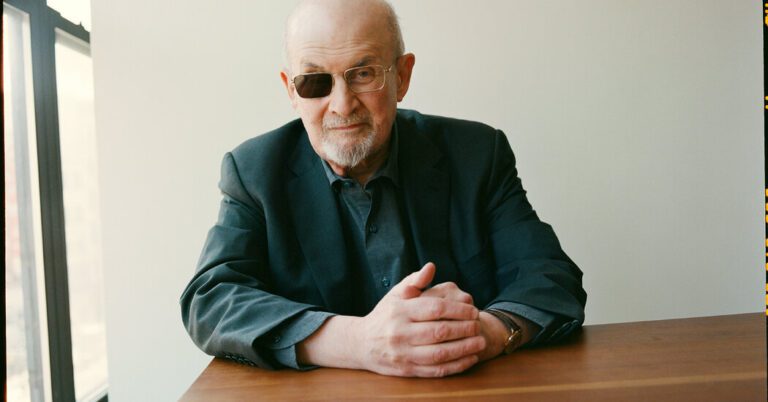
[ad_1]
In his candid, plain-spoken and gripping new memoir, “Knife: Meditations After an Attempted Murder,” Rushdie describes what happened next. The black-clad man, stabbing wildly, had 27 seconds alone with him. That is long enough, Rushdie points out, to read one of Shakespeare’s sonnets, including his favorite, No. 130. He does not print the poem, but I will, to provide a sense of the interminable horror. This is 27 seconds:
My mistress’ eyes are nothing like the sun;
Coral is far more red than her lips’ red;
If snow be white, why then her breasts are dun;
If hairs be wires, black wires grow on her head.
I have seen roses damasked, red and white,
But no such roses see I in her cheeks;
And in some perfumes is there more delight
Than in the breath that from my mistress reeks.
I love to hear her speak, yet well I know
That music hath a far more pleasing sound;
I grant I never saw a goddess go;
My mistress, when she walks, treads on the ground.
And yet, by heaven, I think my love as rare
As any she belied with false compare.
His attacker was at last subdued. Blood was everywhere, pooling. Rushdie’s clothes were cut off him. His legs were raised to keep what blood he had left flowing to his heart. He remembers feeling humiliated. “In the presence of serious injuries, your body’s privacy ceases to exist,” he writes. The reader considers it a good sign, for Rushdie’s health and for the tone of this humane and often witty book, that among his first thoughts was, “Oh, my nice Ralph Lauren suit.”
A member of his surgery team later tells him, “When they brought you in from the helicopter, we didn’t think we could save you.” Rushdie describes the appalling damage:
There was the deep knife wound in my left hand, which severed all the tendons and most of the nerves. There were at least two more deep stab wounds in my neck — one slash right across it and more on the right side — and another farther up my face, also on the right. If I look at my chest now, I see a line of wounds down the center, two more slashes on the lower right side, and a cut on my upper right thigh. And there’s a wound on the left side of my mouth, and there was one along my hairline too.
And there was the knife in the eye. That was the cruelest blow, and it was a deep wound. The blade went in all the way to the optic nerve, which meant there would be no possibility of saving the vision. It was gone.
As bad as this was, he had been fortunate. A doctor says, “You’re lucky that the man who attacked you had no idea how to kill a man with a knife.”
This is Rushdie’s second memoir. His first, “Joseph Anton” — the title refers to the pseudonym he used when in hiding — was published in 2012. “Joseph Anton” is a sophisticated and multilayered book that recounts his years on the lam. It’s a book about friendship, about the many people who took him in. It was also a book about divorce. He was in the process of separating from his second wife, the novelist Marianne Wiggins, when the fatwa was announced, and during the book his third marriage, to Elizabeth West, falls apart as well.
“Knife,” on the other hand, contains a love story. Rushdie recounts meeting, wooing and marrying the American poet and novelist Rachel Eliza Griffiths, three decades his junior. She is now Lady Rushdie; her husband was knighted in 2007 for services to literature. Their story adds buoyancy to this memoir. But it takes a long time for that light to pour in. First there will be arduous recovery and rehab.
The poet John Berryman said an artist is lucky when “presented with the worst possible ordeal which will not actually kill him. At that point, he’s in business.” This is cynical but true. I’ve rarely read about worse physical trauma.
[ad_2]